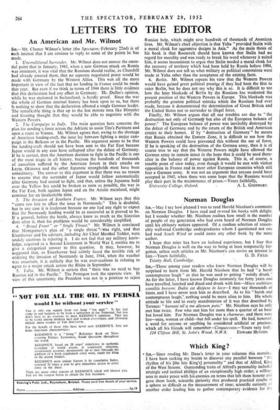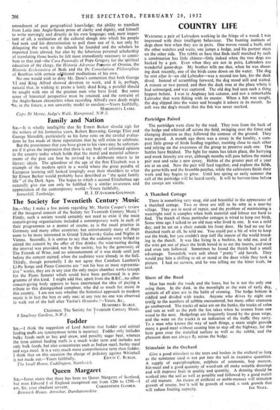Which King?
• Sta,—Since reading Mr. Dane's letter in your columns this morning. . I have been racking my braids to discover any parallel between "the rhythm of his [the late King's] personality" and that of Alfred, King of the West Saxons. Outstanding traits of Alfred's personality included strategic and tactical dbilities of an exceptionally high order; a willing- ness to make peace with his enemies on terms that left them honour and gave them lands, scientific curiosity that produced practical results in a sphere so difficult as the measurement of time; scientific curiosity of another order leading him to gather contemporary 'evidence for the
amendment of past geographical knowledge; the ability to translate from Latin into Anglo-Saxon prose of clarity and dignity, and himself to write movingly and directly in his own language; and, most impor- tant of all, a realisation of the cultural slough into which his people had sunk and his determination to pull them out of it, not only by delegating the work to the schools he founded and the scholars he imported from abroad, but also by the laborious personal scholarship of translating those books he felt most immediately necessary to contri- bute to that end—the Cura Pastoralis of Pope Gregory for the spiritual education of the clergy, the Historia Adversus Paganos of Orosius, the Historia Ecclesiastica of Bede and the De Consolatione Philosophiae of Boethius with certain additional meditations of his own. No one would wish to deny Mr. Dane's contention that both George VI and King Alfred showed devotion to work, and it is, perhaps, natural that, in wishing to praise a lately dead King, a parallel should be sought with one of the greatest men who have lived. But some sense of historical perspective must be retained, and the restraint of the Anglo-Saxon chroniclers when recordipg Alfred's own death might °be, in the future, a not unworthy model to emulate.—Yours faithfully,
MARGHANITA LASKI.
Capo Di Monte, Judge's Walk, Hampstead, N. I17.3.



































 Previous page
Previous page